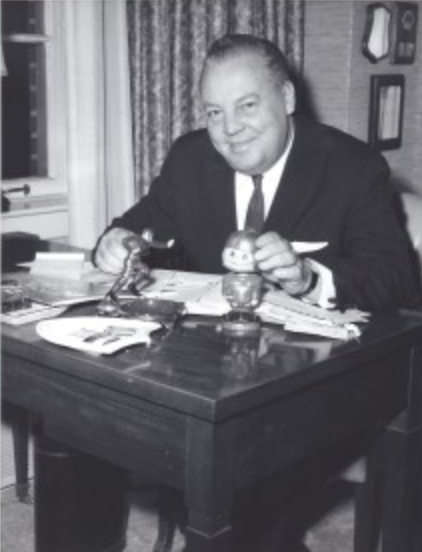Today In Sports History 6/9/1960
Sportscaster, ABC Sports Director, and New York Titans owner Harry Wismer. (Photo by Getty Images)
The American Football League’s (AFL) contract with ABC revolutionized sports television. In 1959, Lamar Hunt and a group of young millionaires created the AFL. This new league challenged the established National Football League (NFL). The AFL successfully merged with the NFL in 1966. AFL’s television contract with ABC was an early but crucial step toward the merger.
At the AFL’s fifth annual owner’s meeting, the executive committee decided on an egalitarian television package policy with an equal revenue distribution amongst all the teams. Harry Wismer, chairman of the television committee and New York Titans owner, played a critical role in obtaining the AFL’s ABC broadcasting contract. Wismer was ABC’s former sports director and used his connections for the “cloak and dagger” negotiations.
After several tense meetings on June 9, 1960, the AFL and ABC officially agreed to a deal. ABC agreed to pay the AFL $8.5 million over five years for TV rights, and each AFL squad would receive $205,000 apiece. Additional terms of the final contract are as follows:
• ABC possess sole rights to telecasting and sponsorships.
• The visiting franchise would broadcast their game to their home city while the home team had the game blacked out in their area.
• ABC could leave the contract if the number of teams fell below eight.
• ABC also had rights to the names, likenesses, and biographies of coaches, players, owners, and teams for promotional reasons.
The cooperative television deal did not extend to radio, where each team had to negotiate with each station and find separate sponsors independently.
The collective television deal was revolutionary because it allowed for parity between small and large market teams and provided a steady revenue stream through the AFL’s difficult early years. In its first year of operations, The AFL earned more TV money than five NFL clubs. In comparison, the NFL’s TV deal allowed teams to negotiate contracts and sell their rights individually. Thus, creating a severe imbalance between small-market teams like Green Bay and large markets like New York. This revenue imbalance allowed large market franchises to pay large amounts of money to acquire talent, build better facilities, and create a better game experience. The financial inequality from television revenue made the game unfair and hurt Football’s popularity since nobody wanted to watch one team continuously dominate.
The AFL’s cooperative deal was so monumental that Bert Bell’s successor, Pete Rozelle, adopted the same deal for the NFL. Rozelle later said it was the most important thing he had done as commissioner.
The deal with ABC was a massive step in the right direction for Hunt and the AFL. Still, it created the modern sports television contract that has done professional sports into the juggernaut business we see today.
